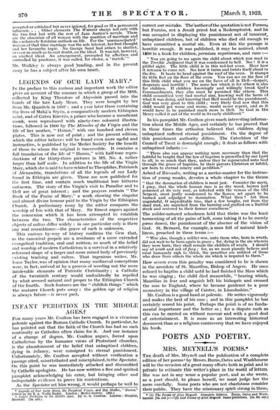INFANT PERDITION IN THE MIDDLE AGES.t
Fon many years Mr. Coulton has been engaged in a vivacious polemic against the Roman Catholic Church. In particular, he has pointed out that the faith of the Church has had no such continuity as Catholics often claim for it. And one instance of a change of dogma, Mr. Coulton argues, forced upon Catholicism by the humaner views of Protestant churches, is the abandonment of the belief that unbaptized children, dying in infancy, were consigned to eternal punishment. Unfortunately, Mr. Coulton accepted without verification a passage cited, misattributed and misexplained, in the Spectator. On this point he was immediately attacked and discomfited by Catholic apologists. He has now written a free and spirited pamphlet acknowledging his error, but bringing other and indisputable evidence to prove his contentions.
As the Spectator set him wrong, it would perhaps be well to
• Legends of Our Lady Mary, the Perpetual Virgin, and Her Mother, "Hanna" Edited by Sir E. A. Wallis Budge. London : Medici Society. 180..]
t Infant Perdition in the Middle Ages. By G. G. Coulton. London : Simpidn, Marshall. (Si. Bet.] correct our mistake. The-author of the quotation is not Furness but Furniss, not a Jesuit priest but a Redemptorist, and he was occupied in displaying the punishment not of innocent, unbaptized children, but of children who died old enough to have committed a mortal sin. Even at this the passage is horrible enough. It was published, it may be noticed, about 1850 in a book for children, permissu superiorum, and runs :- " You are going to see again the child about which you read in the Terrible Judgment that it was condemned to hell. See 1 it is a pitiful sight. The little child is in this red-hot oven. Hear how it screams to come out. See how it turns and twists itself about in the fire. It beats its head against the roof of the oven. It stamps its little feet on the floor of the oven. You can see on the face of this little child what you see on the faces of all in Hell—despair, desperate and horrible ! The same law which is for others is also for children. If children knowingly and willingly break God's Commandments, they also must be punished like others. This child committed very bad mortal sins, knowing well the harm of what it was doing, and knowing that Hell would-be the punishment. God was very good to this child ; very likely God saw that this child would get worse and worse, would never repent, and so it would have to be punished much more in Hell. So God in His Mercy called it out of the world in its early childhood."
In his pamphlet Mr. Coulton gives much interesting informa- tion about the Middle Ages, and certainly he has proved that in those times the orthodox believed that children dying unbaptized suffered eternal punishment. On the degree of this punishment authority differs. The Catechism of the Council of Trent is downright enough; it deals as follows with unbaptized infants :—
" There also can appear nothing more necessary than that the faithful be taught that the law of baptism is prescribed by our Lord to all, in so much that they, unless they be regenerated unto God through the grace of baptism, be their parents Christian or infidel, are born to eternal misery and perdition."
Aelred of Rievaulx, writing as a novice-master for the instruc- tion of young monks, devotes a whole chapter to the theme
" that the damnation of children is most just. Consider (he says), I pray, that the whole human race is as dry wood, barren and poisoned at its very root, as infected with the venom of the Old Serpent, most justly condemned to the flames, set apart to be burned and adjudged to damnation. What then ? Art thou ungrateful, 0 unprofitable tree, that a few boughs, cut from thy dead root, are snatched from the burning and grafted on a fruitful stock and restored to their former comeliness."
The milder-natured schoolmen held that theirs was the least tormenting of all the pains of hell, some taking it to be merely pcena damni, the punishment of the absence of the vision of God. St. Bernard, for example, a man full of natural kind- liness, preached in these terms :-
" Woe also, though a milder woe, unto those who, born in wrath, did not wait to be born again in grace ; for, dying in the sin wherein they were born, they shall remain the children of wrath. I should say of wrath and not of fury ; for, as we most piously believe and most humanely sigh to think, the penalties are mildest of those who draw from others the whole sin which is imputed to them."
How severe even this penalty was considered to be is shown in the anecdote of St. Maurilius, Bishop of Angers. He once refused to baptize a child until he had finished the Mass which he was singing ; the child died meanwhile, " hearing which, Maurilius in fear and anguish left his bishopric and crossed the seas to England, where he became gardener to a poor monastery in the village of Caister, in Lincolnshire."
111r. Coulton is a good hand at polemic. He writes vigorously and makes the best of his case ; and in this pamphlet he hag certainly scored his point. Perhaps the point is of no funda- mental importance and the better so ; for a dispute such as this can be carried on without rancour and with a good deal of entertainment. It is more as an interesting historical document than as a religious controversy that we have enjoyed his book.










































 Previous page
Previous page